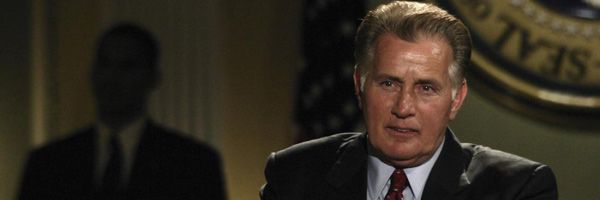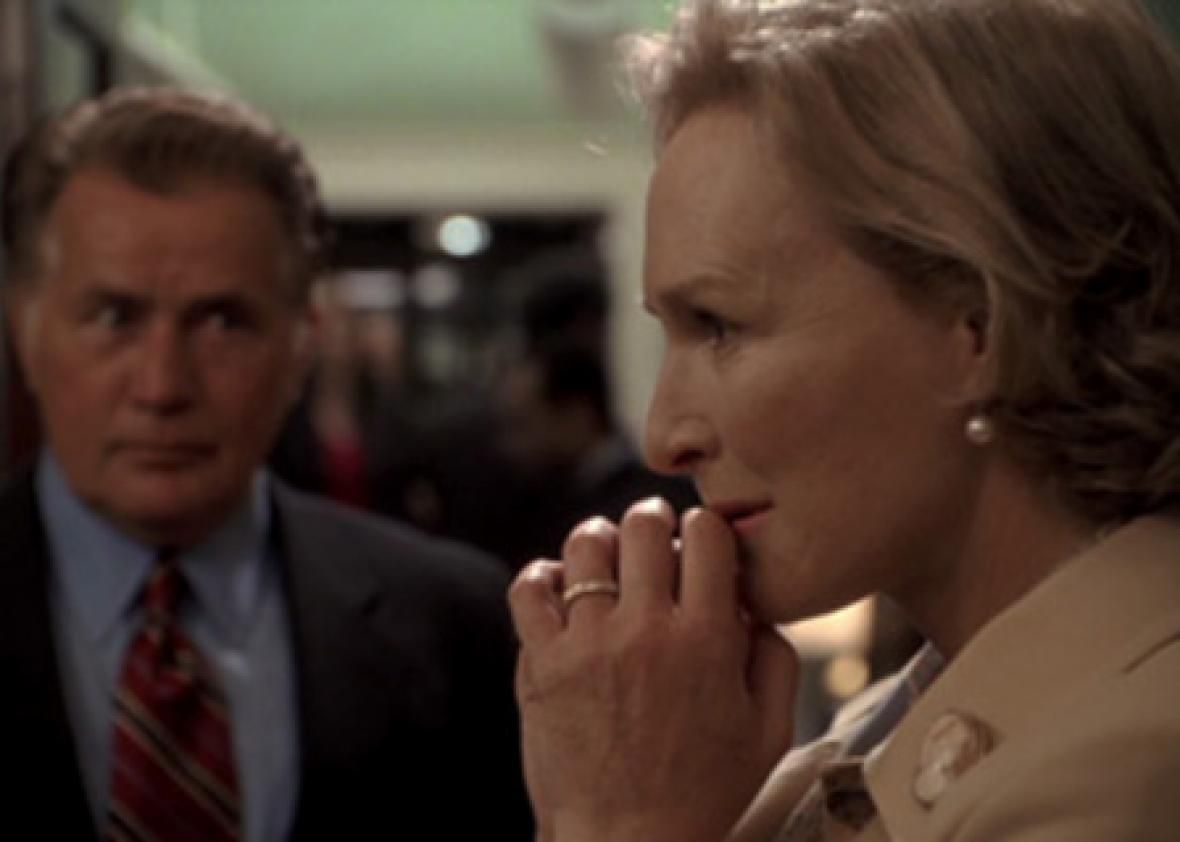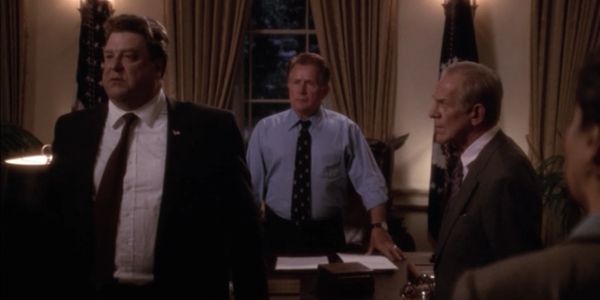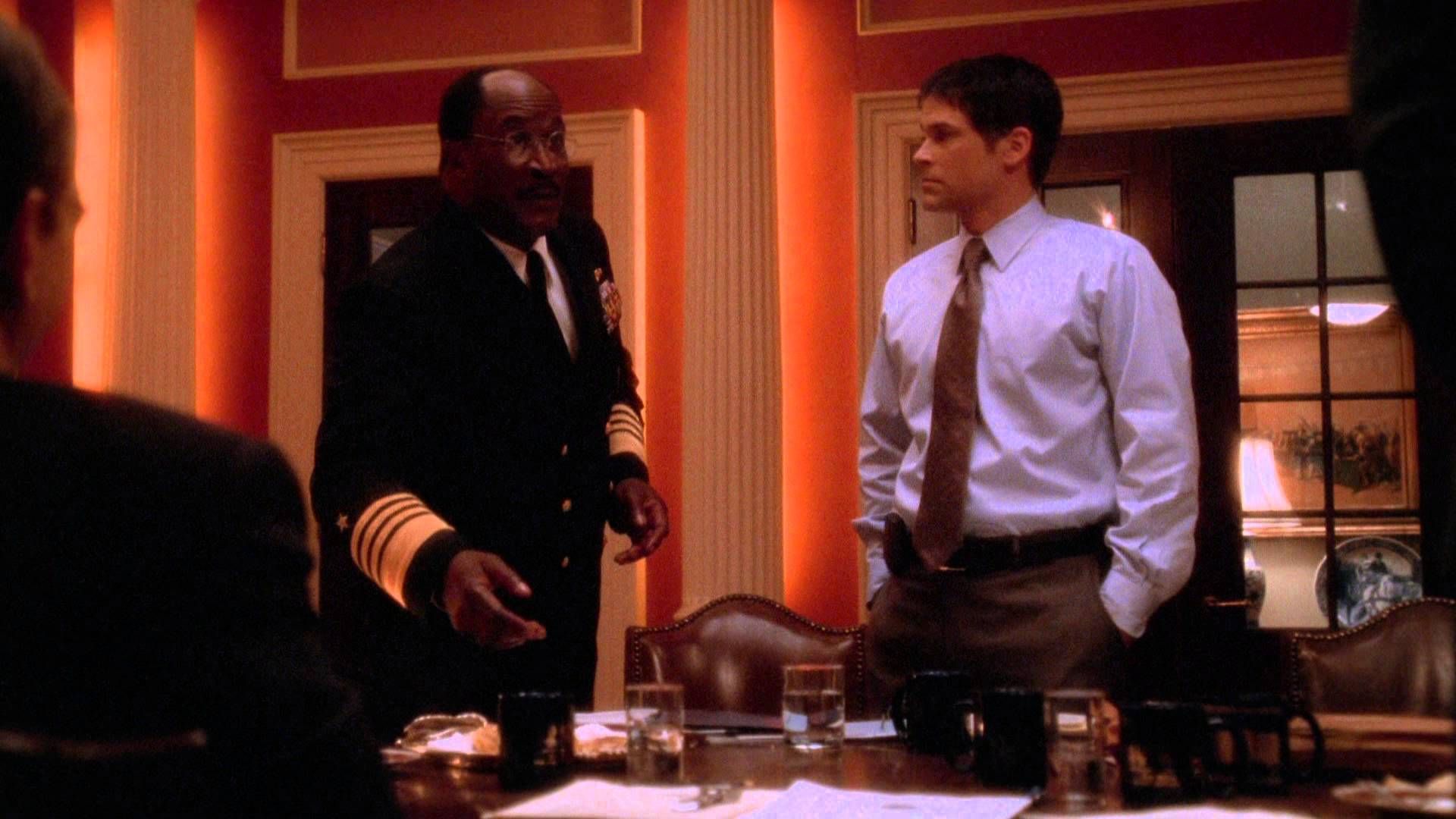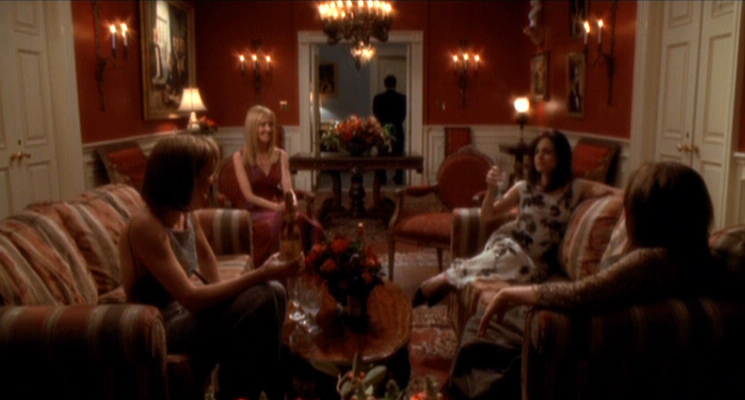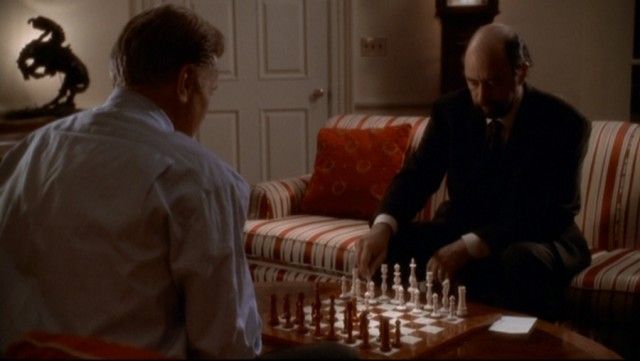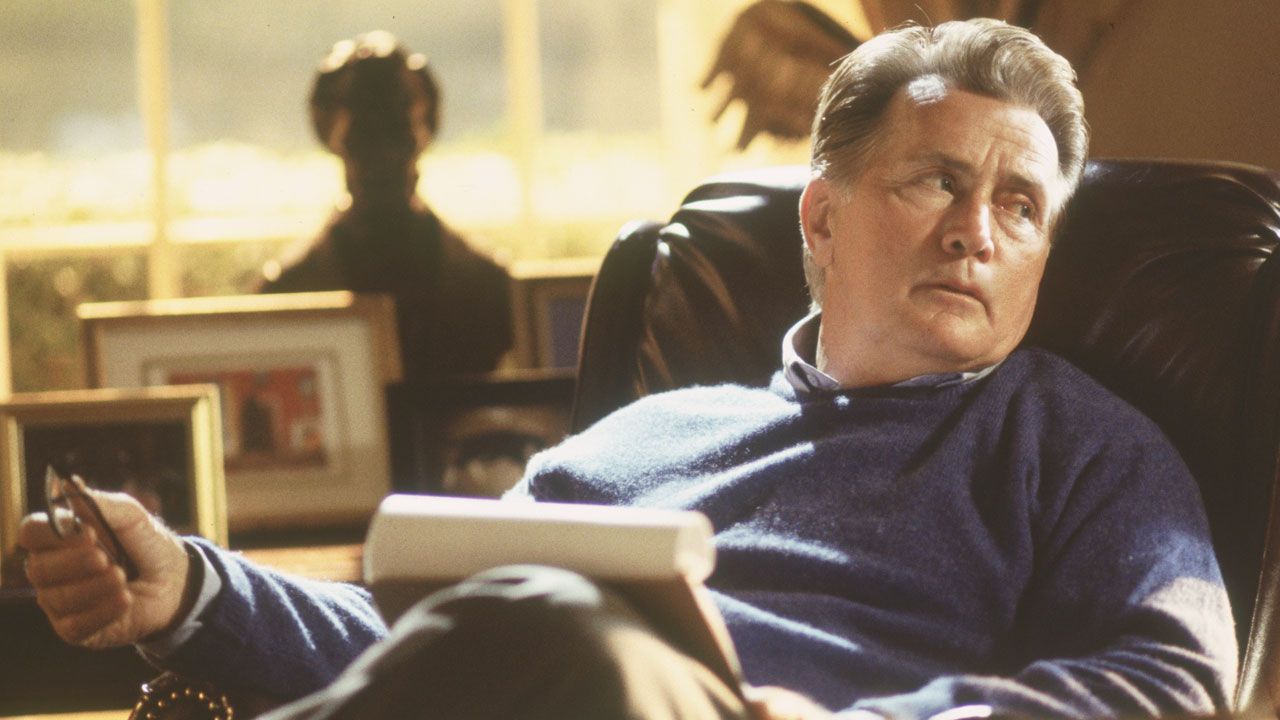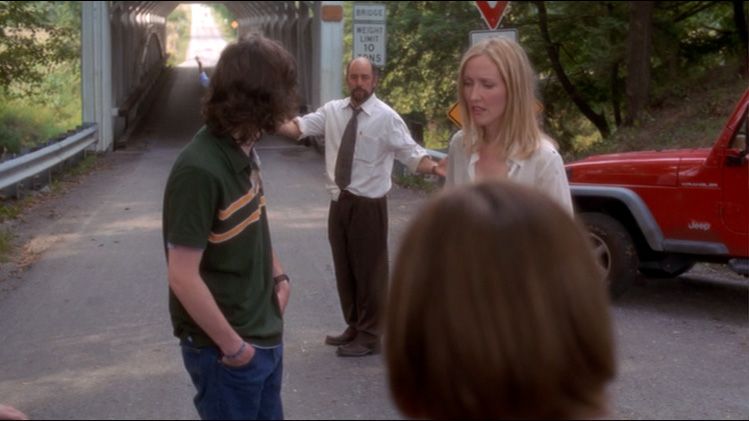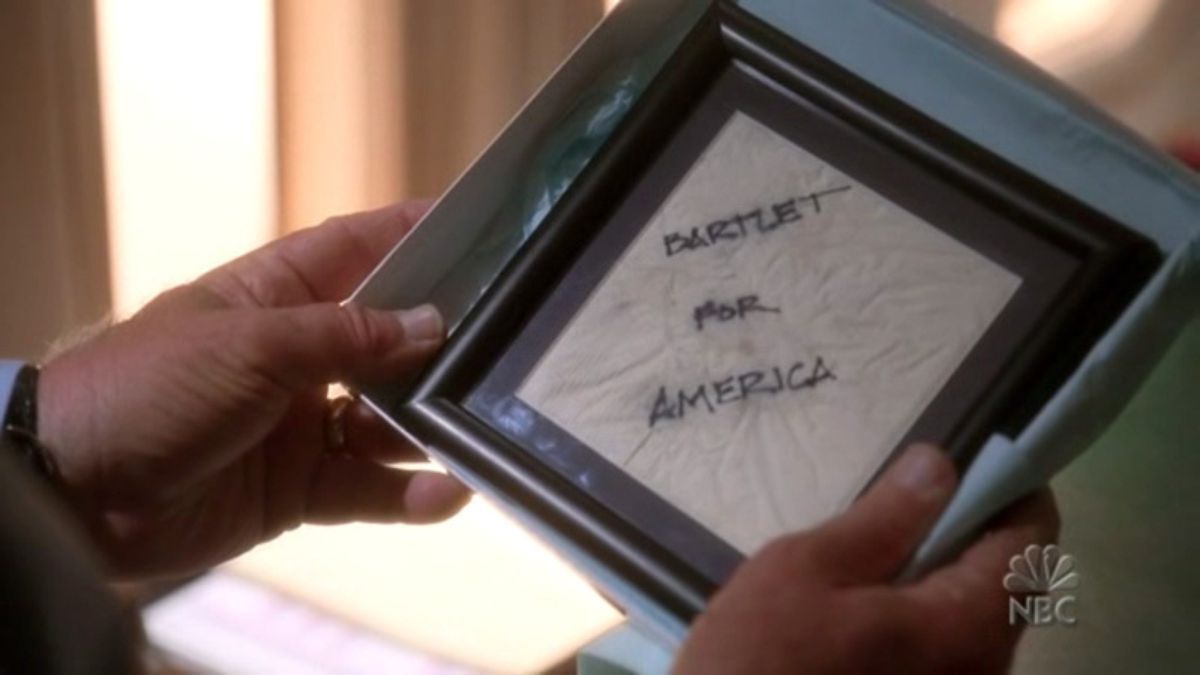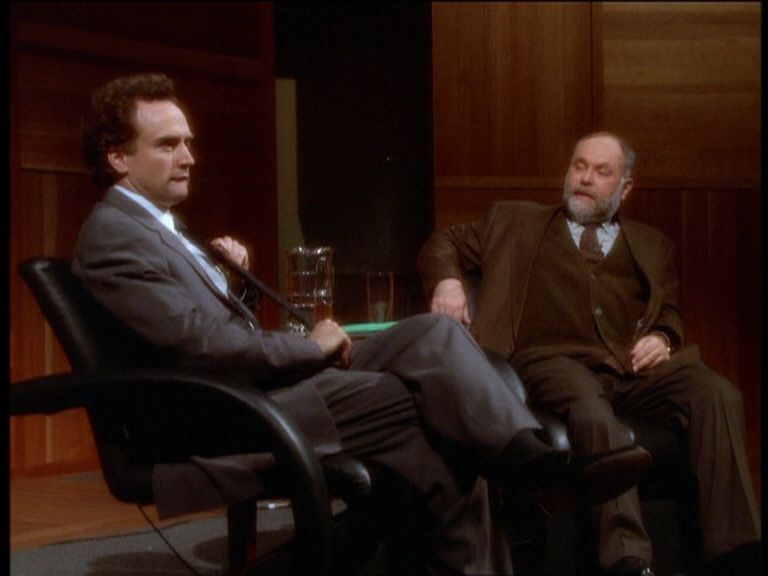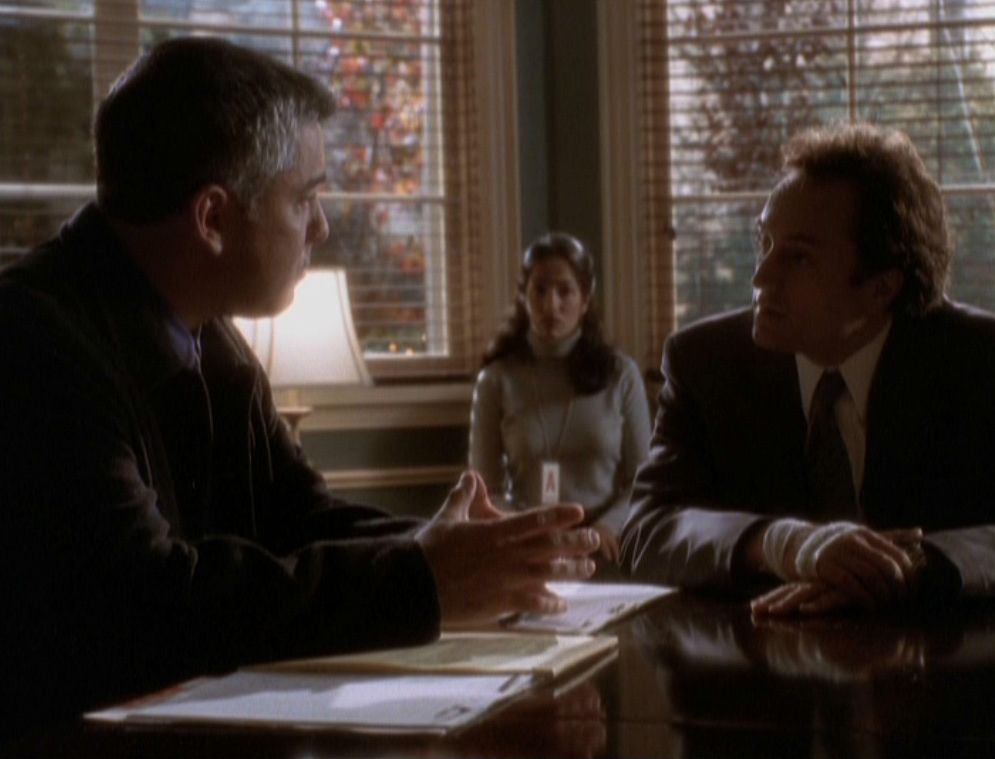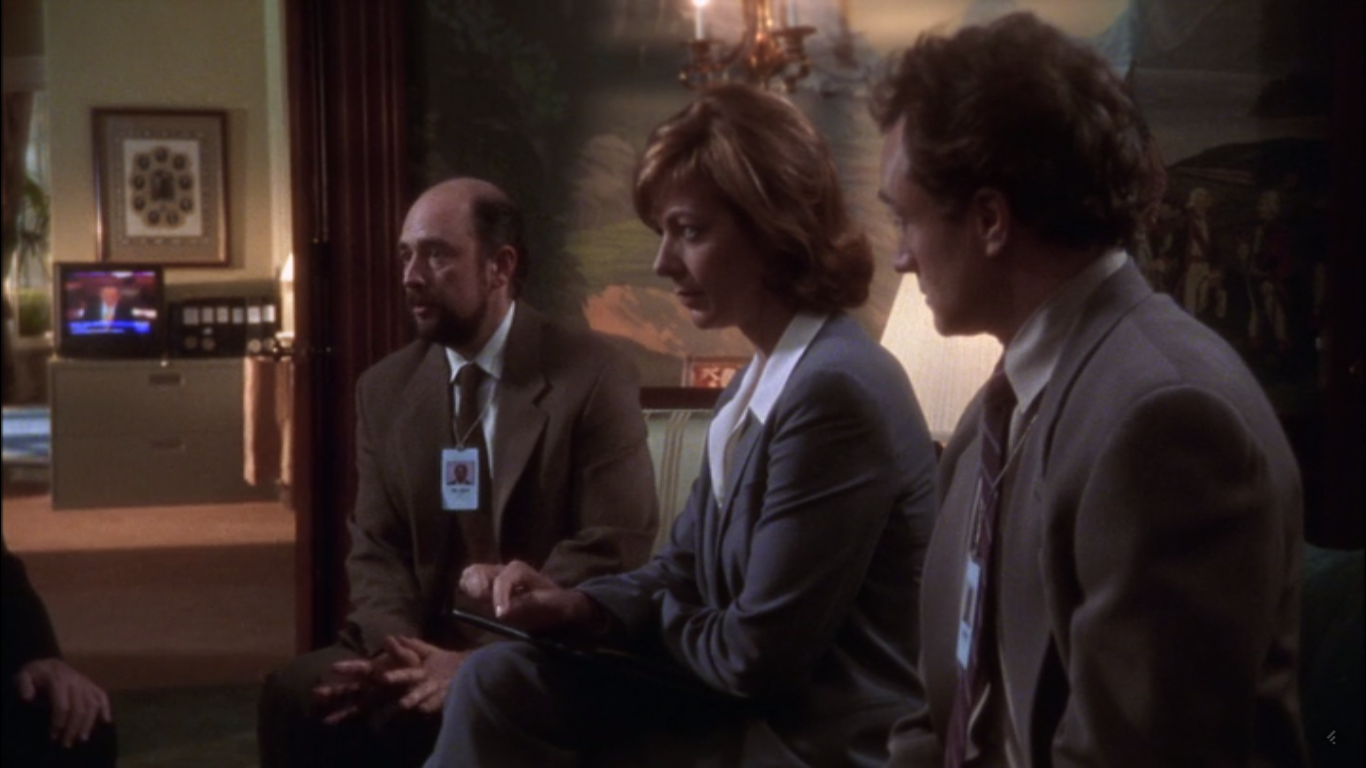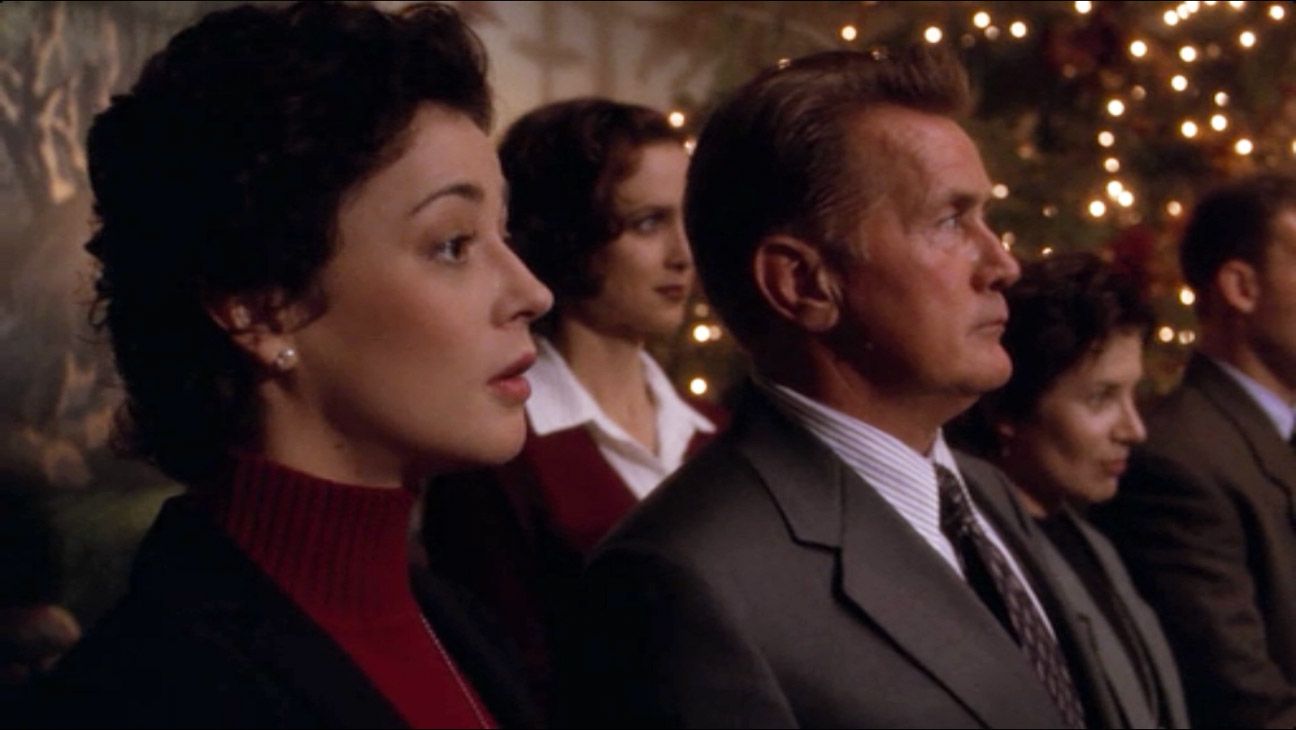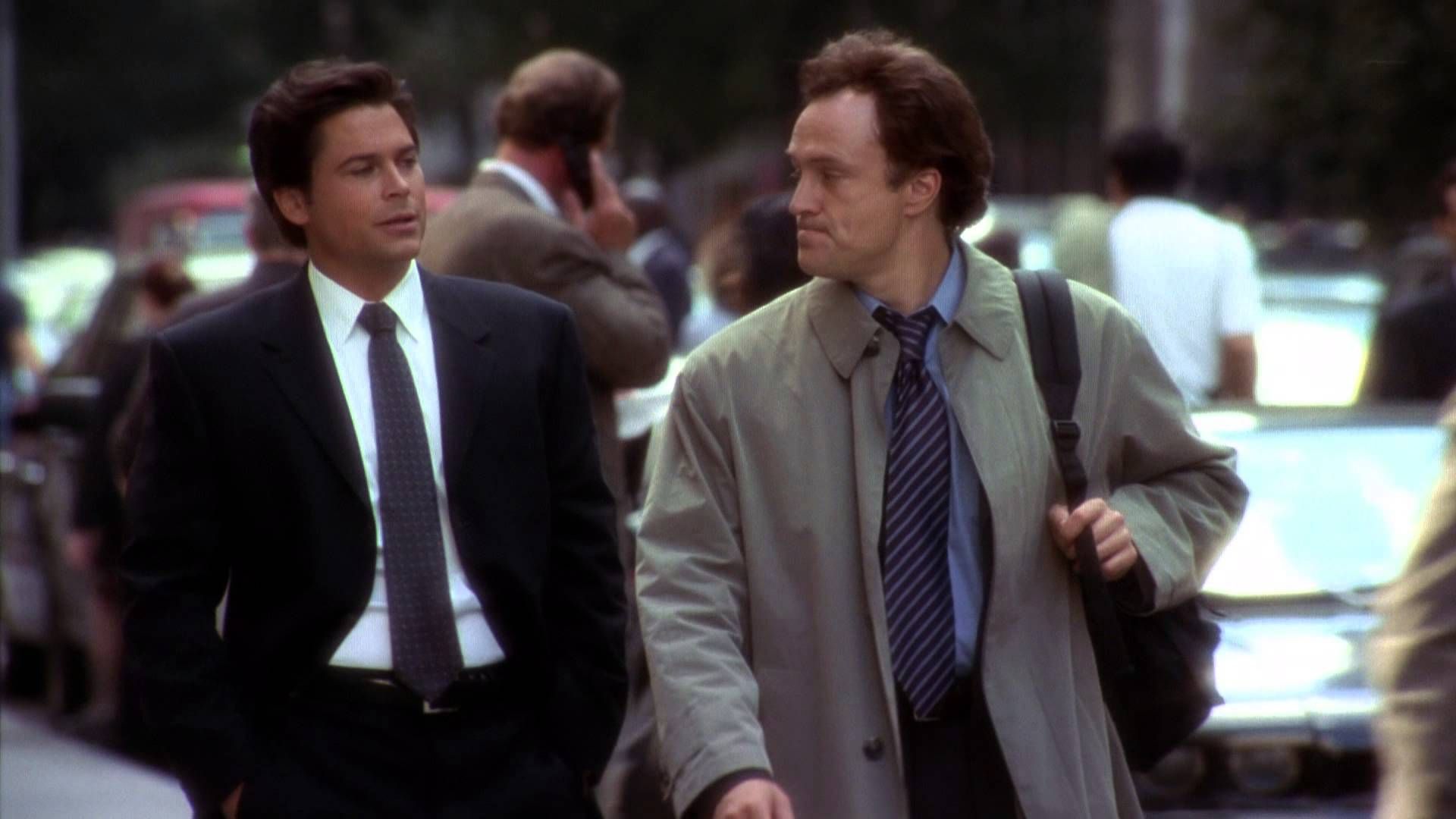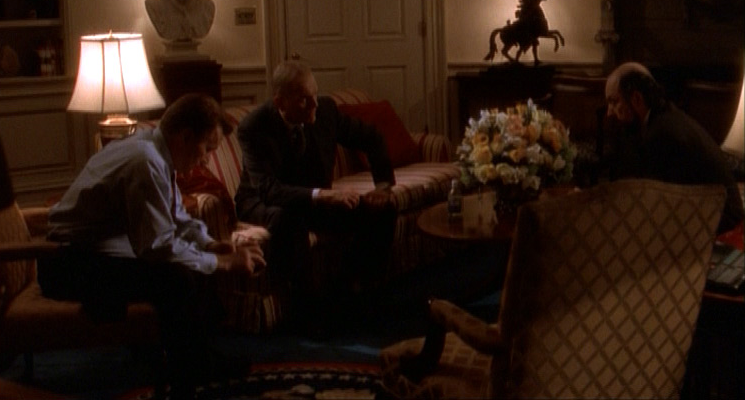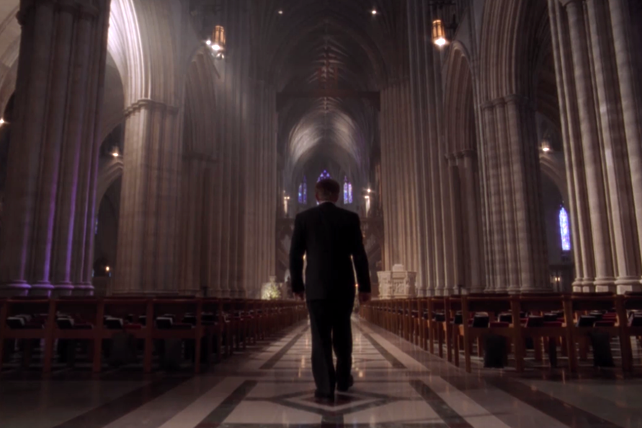Given the omnipresence of politics in the current climate and the recent launch of the West Wing Special on HBO Max, we at Collider thought it was the perfect time to look back fondly at one of fiction’s great political stories: The West Wing. The NBC drama premiered on September 22, 1999 to rave reviews. This brainchild of Aaron Sorkin would go on to set a record for the most consecutive Best Drama Series Emmys, with four wins in its first four seasons.
The show is a brilliant drama about politics, about people, and about America. While it suffered some criticism as simply "wish-fulfillment", at its heart The West Wing is a story about good people trying to do good in the world. The Second Golden Age of Television has given us some tremendously complex and thoughtful dramas about antiheroes and morally ambiguous characters, but the deeply humanist undercurrent of The West Wing is just as compelling and still holds up incredibly well in today's TV landscape.
So in our appreciation of the series, Collider’s own Adam Chitwood and Matt Goldberg have selected the show’s 15 best episodes and ranked them accordingly. Look back with us on one of the best TV shows ever made. And remember, decisions are made by those who show up.
15. "The Supremes"
Season 5, Episode 17
Writer: Debora Cahn
Director: Jessica Yu
Undoubtedly, the last three seasons of The West Wing are inferior to the first four. The departure of creator/showrunner Aaron Sorkin—who wrote 85 of 88 episodes himself—was a huge blow to the series following Season 4, as was the exit of director/executive producer Thomas Schlamme. The West Wing Seasons 5-7 is a different show—more of a procedural in the vein of Law & Order, lacking the humor and warmth of the Sorkin seasons. But they’re not a total wash, and under the eye of new showrunner John Wells (of ER fame), there’s merit to be found if you’re willing to consider it something of a different series. Season 5 is the show’s worst season, but the episode “The Supremes” was a standout and a harbinger of how the show could evolve into a post-Sorkin world. The story of filling a new Supreme Court vacancy with an incredibly liberal judge is wonderfully compelling, made all the better by Glenn Close’s guest appearance. So, in an effort to provide a full picture and throw the post-Sorkin seasons a bone, “The Supremes” lands at the end of our list here as an example of the show soaring to “perfectly adequate, sometimes swell” heights after Sorkin left. – Adam Chitwood
14. "Twenty Five"
Season 4, Episode 23
Writer: Aaron Sorkin
Director: Christopher Misiano
I like to look at “Twenty Five” as a metaphor for Sorkin leaving The West Wing. Sorkin pictures himself as Bartlet. Zoe (the show) has been taken away, and Bartlet can no longer do what he feels must be done because he’s been compromised. His solution is to take his characters (the cast and crew) and entrust them to the leadership of Glen Allen Walken (executive producer John Wells), who isn’t a bad guy but clearly has a different set of beliefs. Bartlet doesn’t get to make a graceful exit. He’s told, “You are relieved, Mr. President,” and just like that, the Sorkin years come to a close.
It’s not the best episode of The West Wing, but the episodes that came after were never as good. The series rebounded in seasons six and seven, but “Twenty Five” is the last hurrah of the singular show Sorkin created. The episode is a cliffhanger, but it’s also kind of a series finale and a bittersweet farewell to some of the best television that’s ever been broadcast. – Matt Goldberg
13. "Let Bartlet Be Bartlet"
Season 1, Episode 19
Writer: Aaron Sorkin
Director: Laura Innes
Season 1 of The West Wing is remarkably fleet-footed and self-aware to the point where I have to believe Sorkin knew he was building to this episode. Up until “Let Bartlet Be Bartlet” he had painted the Bartlet Administration as a collection of well-meaning people who couldn’t affect any meaningful change. It’s an odd position in which to put your characters because you’re basically saying, “Here are people who care deeply about their jobs, but they’re also kind of bad at their jobs.” While it’s never overt that the Bartlet Administration is a disaster, Sorkin laid the foundation with Mandy’s hiring (a person whose sole concern is that it’s better to look good than be good), the screw-ups during “The State Dinner”, Bartlet getting chewed out by the retiring Supreme Court justice, and so on.
It all comes into focus in “Let Bartlet Be Bartlet”, which changes the entire tenor of the series. If The West Wing had started with this episode, it would have come too soon, and yet if the series had continued on with the same difficulties, it would have become rote. “Let Bartlet Be Bartlet” is a turning point episode where Sorkin announces that he’s going to make a show about government at its best. His characters aren’t always going to win, but they’re going to let us believe in a better government than we’ll ever get. While this does push The West Wing into the realm of “fairy tale”, when current politics are so depressing, it’s not a bad thing to have a show that makes us dream of something better. – Matt Goldberg
12. "Dead Irish Writers"
Season 3, Episode 15
Writer: Aaron Sorkin
Director: Alex Graves
Aaron Sorkin has gotten a lot of flack in his career for his, shall we say “old fashioned” approach to female characters, but there are plenty of female characters in The West Wing that are portrayed with nuance and agency. Mary-Louise Parker’s Amy Gardner is a shining example of this, and “Dead Irish Writers” is an episode that zeroes in on the show’s female characters in a compelling, dynamic way as Abby contemplates the loss of her medical license. This is one of the show’s many episodes that showcase Sorkin’s talent for weaving both pitch-perfect comedy and intensely dramatic moments in successive scenes (sometimes even the same scene), as we enjoy Abby getting drunk with C.J., Amy, and Donna while she also discusses her ethically murky actions regarding the treatment of her husband’s MS. The episode culminates in a beautiful, loving moment between Abby and the President, further solidifying them as one of TV’s best and most loving onscreen couples. – Adam Chitwood
11. "Hartsfield's Landing"
Season 3, Episode 14
Writer: Aaron Sorkin
Director: Vincent Misiano
By the middle of Season 3, it was clear that Sorkin was trying to give Rob Lowe more to do—to have an actor of his caliber playing a speechwriter was limiting to be sure, and some storylines worked better than others. However, “Hartsfield’s Landing” is a great showcase for both Lowe and Sam Seaborn, as Sorkin really evokes Sam’s political future in a compelling and entertaining way. But the episode is also something of a sequel to “17 People”, as Bartlet carries on simultaneous chess matches with Sam and Toby, attempting to work out his issues with the latter. The Bartlet/Toby relationship was always one of the show’s most interesting dynamics as Toby was the one staff member who wasn’t afraid to call Bartlet out, and indeed chess turns out to be the perfect metaphor for how the two navigate many of their more testy conversations. This is also the episode where C.J. and Charlie are in a prank war, and while The West Wing is certainly a tremendous political drama, these kinds of subplots are great reminders that the show could also do comedy just as well. Sometimes a crazy-glued phone is just funny. – Adam Chitwood
10. "Take This Sabbath Day"
Season 1, Episode 14
Writer: Aaron Sorkin
Director: Thomas Schlamme
One of Sorkin’s strokes of genius in the first season of The West Wing was presenting a liberal president who was also devoutly religious. Barlet’s Catholicism is not just a side-note to his character, but a deeply important part of his life that influences a lot of the decisions he makes. And so in “Take This Sabbath Day”, Sorkin approaches the debate over the death penalty from a deeply personal perspective, as Bartlet attempts to reconcile his faith with the federal government ordering the death of another human being. This “faith question” would reverberate throughout the series and inform its best episode, but in “Take This Sabbath Day” Sorkin really hits a strong balance between the political and the personal. – Adam Chitwood
9. "20 Hours in America"
Season 4, Episodes 1 & 2
Writer: Aaron Sorkin
Director: Christopher Misiano
Sorkin’s stabs at two-parters were sometimes tremendous feasts, and “20 Hours in America” is a terrific blend of hilarious comedy, doubling down on the stakes of the Season 3 finale, and topical drama. Stranding Josh, Donna, and Toby in Indiana after being left by the motorcade results in some of the show’s very best comedic moments, as evidenced by Josh and Toby’s reaction to finding out they switched time zones in their effort to catch the flight back to Washington. But the episode also does a fantastic job of picking up where the Season 3 finale left off, addressing Bartlet’s decision to assassinate a foreign leader as well as the death of C.J.’s secret service detail. It culminates in an emotional climax in which Sorkin crafts a fictional terrorist incident and, in the process, finally finds the right way to address 9/11 after attempting to navigate similar territory throughout Season 3. It’s a reminder that Sorkin is a wordsmith prodigy, and draws a great parallel from our real world to this fictional one without coming off as glib or opportunistic. – Adam Chitwood
8. "Bartlet for America"
Season 3, Episode 9
Writer: Aaron Sorkin
Director: Thomas Schlamme
I don’t know why I’m partial to flashback episodes. Perhaps it’s because they illustrate a side of a character we haven’t seen before, so showing their past helps inform their present. “Bartlet for America” takes us further back than we’ve ever been in The West Wing by showing Leo approaching Governor Bartlet to run for President, and it paints Leo as the genesis of the entire world we’ve come to appreciate over the course of the series.
But beyond the larger scope of the show, “Bartlet for America” paints an intimate portrait of Leo McGarry and it features the late John Spencer at the top of his game. While post-Sorkin seasons lost their handle on Leo and painted him as a borderline-antagonist, Sorkin understood that everything Leo did he did out of love. He may have played political hardball, but when it came to the people in his life, he would lie down in traffic because of them, and “Bartlet for America” gives us insight into why. All of Leo’s strengths and weaknesses are laid bare. We see him toying with congress in the hearings and in the depths of a bender in the flashbacks. We see him at his best and worst, and “Bartlet for America” shows how these highs and lows form a unique individual. – Matt Goldberg
7. "Celestial Navigation"
Season 1, Episode 15
Writer: Aaron Sorkin
Director: Christopher Misiano
Most shows wouldn’t take the structural chance “Celestial Navigation” offers in its first season. This is the kind of episode most shows come to in their second or third season once they have their footing and want to stretch their creative muscles. But Sorkin being Sorkin, he’s in no mood to wait and offers a terrific framing device where Josh is telling of the past week’s events while Sam and Toby are in the middle of trying to solve their Mendoza problem.
“Celestial Navigation” also happens to be one of the funniest episodes of The West Wing and while the show won Best Drama four years in a row, it probably could have competed for Best Comedy and picked that up as well. In “Celestial Navigation”, Sorkin shows that he knows his characters so well that he can freely mess with them and put them into uncomfortable positions. He knows the entertainment value of having smart people make dumb mistakes, and whether it’s played as a gaffe like Bartlet giving a bad statement or Josh’s disastrous press conference, it works. And yet the show never loses sight of its dramatic heft, and Mendoza’s explanation for his arrest still (sadly) resonates today. – Matt Goldberg
6. "Noel"
Season 2, Episode 10
Writer: Aaron Sorkin
Director: Thomas Schlamme
Before The West Wing, I best knew Bradley Whitford as the villain from Billy Madison, and while he’s very funny in that role, he will now always be Josh Lyman. It’s a career-defining role, and while Josh more often than not got to play to the show’s comic moments during the Sorkin years (he would become more serious and to an extent somewhat unlikeable in Seasons 5-7), he got an unbelievable showcase for his dramatic side in “Noel”.
“Noel” is a smart episode because while “The Midterms” shows the rest of the characters dealing with the fallout from the shooting, we didn’t really get to see much of how Josh was reacting, and, having come near death, it turned out his reaction was the most profound and heart-wrenching. Watching him start to come apart at the seams is shocking, and yet the show always comes back to the love these characters have for each other. Leo’s parable about the man who falls in a hole is an example of the kindness and decency The West Wing presents in spades. While conflict is all well and good, sometimes it’s powerful to just watch people be good to each other. – Matt Goldberg
5. "Pilot"
Season 1, Episode 1
Writer: Aaron Sorkin
Director: Thomas Schlamme
Most shows don’t have great pilots. They’re designed to be functional rather than artistically daring. A good pilot has to introduce the characters, their relationships, the world, and the conflicts the characters will face. Not only do most shows struggle to meet this simple requirement, they usually don’t know what they are until a few episodes into their first season. A pilot, more often than not, is a sketch, and it asks the audience if the sketch is good enough for people to see how it develops.
The West Wing is not your typical pilot. It does all the things a good pilot should do, but it does them with such confidence and style that you would think the show had already been running for at least half a season. The pilot isn’t "peak West Wing," but it declared a remarkably self-assured drama that instantly knew its characters, their voices, and their environment. The pilot for The West Wing wasn’t a sketch in search of a show; it was a foundation for a monument. – Matt Goldberg
4. "In Excelsis Deo"
Season 1, Episode 10
Writers: Aaron Sorkin & Rick Cleveland
Director: Alex Graves
You’d be hard-pressed to find a better example of The West Wing’s humanism than “In Excelsis Deo.” The first season’s Christmas episode set a show tradition of holiday-themed installments that would tackle tough and emotionally difficult storylines, with the prickly Toby Ziegler taking it upon himself to set up a military funeral for a homeless veteran found dead wearing his coat. This is a “feel-good” episode that refuses to get maudlin or saccharine, instead of seizing upon the truth that people are inherently good. The West Wing, at heart, is about good people trying to do good in the world, and “In Excelsis Deo” is that thesis statement in a nutshell. It's also, somewhat surprisingly, the only episode that won Sorkin a Best Writing Emmy, despite his herculean efforts in the seasons to come. – Adam Chitwood
3. "In the Shadow of Two Gunmen"
Season 2, Episodes 1 & 2
Writer: Aaron Sorkin
Director: Thomas Schlamme
What’s brilliant about “In the Shadow of Two Gunmen” is that the manhunt is pretty much an afterthought. It’s not about the shooting; it’s about the victims, and the victims are the characters we love. Sorkin wisely doesn’t kill off Mandy (because then the characters would have to deal with the death of a character no one particularly liked) and just sort of sent her away into the ether without an explanation. He then turns the focus on the formation of the Bartlet campaign.
In a way, “In the Shadow of Two Gunmen” functions as a second pilot, an attempt to start the show by imagining if it had begun during Bartlet’s campaign for president rather than in the middle of his first term. It makes for interesting flashbacks the further establish who the characters are and the strength of their relationships. “In the Shadow of Two Gunmen” is where I first started watching The West Wing, and while people should obviously start at the terrific pilot, the second season premiere isn’t a bad place to start either. – Matt Goldberg
2. "17 People"
Season 2, Episode 18
Writer: Aaron Sorkin
Director: Alex Graves
There are many episodes in which Sorkin’s theater background comes in handy, but “17 People” might be the most play-like episode of The West Wing’s entire run. A number of shows throughout history have been ruined by a major plot twist or thread that the writers fumble as it unravels, but here Sorkin lets Bartlet’s MS revelation to Toby simmer as the tension builds and builds. The episode is basically a two-hander between Martin Sheen and Richard Schiff, and the duo turn in a pair of tremendous performances as their conversation wavers from uneasy to an outright shouting match. This is one of quite a few episodes where Sorkin “bottled” his cast and simply covered the course of events over one evening or day, but the handle on tension is deftly maneuvered by director Alex Graves (future Game of Thrones MVP), who allows the audience to breathe during breaks in the conversation between the President and Toby, but never fully lets the tension release. And while things get tense, Sorkin and Graves maintain a laser focus on the emotional impact of this conversation, never letting the plot revelation overshadow what these characters are feeling. – Adam Chitwood
1. "Two Cathedrals"
Season 2, Episode 22
Writer: Aaron Sorkin
Director: Thomas Schlamme
“Two Cathedrals” is one of the best hours of television ever produced. The Season 2 finale is the culmination of the show’s MS storyline, with President Bartlet guilt-ridden over the death of Mrs. Landingham, which he views as God punishing him directly. It’s a travesty that Martin Sheen never won an Emmy for his performance as Bartlet, and it’s even more baffling that this isn’t the one that solidified it. His haunted, angry, aloof manner in this episode is a tight-rope walk that Sheen pulls off with grace, and Bartlet’s scene in the cathedral in which he calls out God is a show-stopping moment. The episode deftly doubles down on one of Bartlet’s most interesting traits, which is his reconciliation between his Catholicism and the tough decisions he has to make, and in “Two Cathedrals” we see him laid bare, full of conflicting emotions. This is The West Wing at its very best, and thumb your nose at network TV all you want, but I'd stack this episode up against the best installments of The Sopranos, Mad Men, and Breaking Bad any day. – Adam Chitwood

